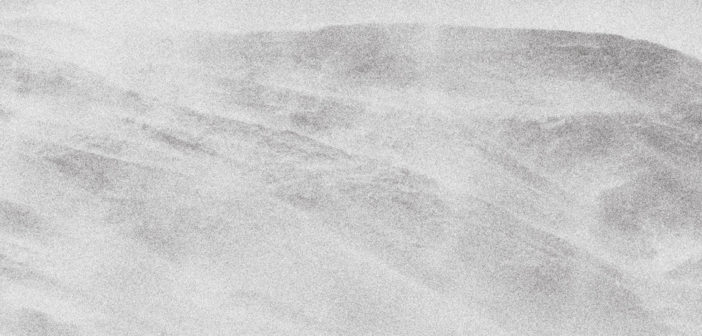Having watched a few seasons of the US reality television series Alone, where participants film themselves living off the land in far flung wilderness locations around the world, I feel a little bit prepared for the first track of Lawrence English’s Viento (wind in Spanish). One series was filmed in a national park in Patagonia Argentina, a place where the wind could just scream for days, and its here, or at least in town, that English, during a layover on the way to Antarctica collected the field recordings that make up the first track.
In the liner notes he describes the wind as being so physical that it was difficult to catch his breath and you can hear this unrelenting force in these recordings. Metal rattles, creaks and groans over the ever present whoosh and howl of the wind for almost 20 minutes. At times it builds in density until something clatters away, at others it subsides (just a little bit) into a dull howl. Recording wind is fascinating, because you’re always recording something being impacted on – it not necessarily the force itself. It’s the sound of wind through spaces, abandoned buildings, lone trees folded over in fields of tundra-like grasses, quivering road signs, wailing fences and other objects shaken into life by the wind.
It’s the kind of recording where you pour yourself a glass of red, sit in front of the fire and hope someone comes to you with a pipe and slippers. Failing that you’ll want to listen to it while you are warm, because it really feels experiential, thrusting you headlong into the wind itself.
The second, 16 minute track is when he finally made it to Antarctica. The recordings that comprise this piece were made during two blizzards at Marambio and Esperanza bases. During the blizzard in Marambio, the temperature dropped to -40 degrees centigrade (with wind chill). What’s most surprising is that these recordings are significantly more subdued than the Patagonia recordings – possibly because the temperature might have restricted movement somewhat. These recordings have significantly more bottom end rumbling, and the wind feels more contained – less destructive – possibly because there was less for it to collide with and impact upon. There is no mistaking the power of the wind however. It’s deep brutal and unrelenting. English too does a great job of layering subtle chiming or the fluttering of plastic (?) midway through the pieces, offering a real compositional development.
These recordings from 2012 have been remixed and remastered for this recording. They’re fascinating and quite dynamic field recordings from an incredibly inhospitable environment, demonstrating the extreme power of mother nature.




